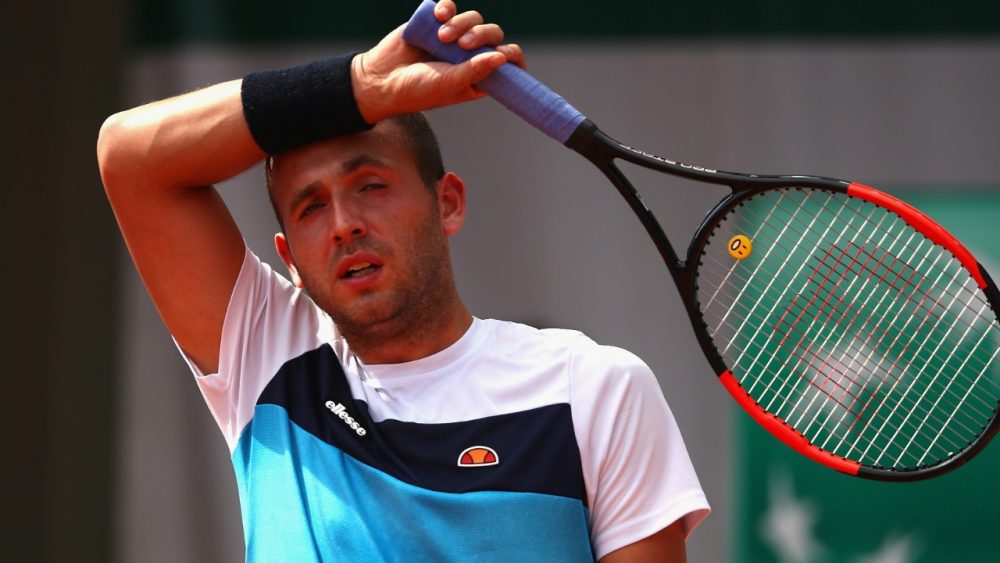Welcome to Tennis Elbow, the column that looks back on the week that was in the world of tennis. This week, Charles Blouin-Gascon recaps the latest in tennis doping.
At long last, there is finally new developments in the world of tennis doping, aren’t we right?
You’ll excuse us but this beat, this world of doping (or not) in the sport of tennis, has been one that we’ve found to be utterly fascinating ever since Maria Sharapova first tested positive for meldonium.
The Russian has come back to action over the spring, and then the summer once they let her play, finally, and there really isn’t much new in her case other than the fact that she has kicked as much ass as it is possible to envision someone kicking after a 15-month suspension.
But there is news, yes, what with a player named Dan Evans being suspended after testing positive for cocaine. Let’s look at the particulars of this case.
Who is Dan Evans?
Daniel “Dan” Evans is a 27-year-old British tennis player who’s ranked No. 135 in the world with a career-high of No. 41. His claim to fame, if anything, is beating seventh seed Marin Cilic to reach the fourth round at this year’s Australian Open.
Oh so basically he’s a nobody?
Basically, yes.
What is cocaine?
HA! Nice one… Cocaine is a hell of a drug.
So what did Dan Evans do exactly?
Evans apparently had an April 2017 sample that tested positive for cocaine, yes. For that, he’s been banned a full year. And for that, he is super, duper sorry. “I do not condone for one second to anyone that this is acceptable behaviour,” he said. “I have let a lot of people down – my family, my coach, my team, sponsors, British Tennis and my fans. I can only deeply apologize from the bottom of my heart.”
See? Super, really, really sorry 🙁 🙁 🙁
So what now?
Well now, Evans is suspended for a full year.
For cocaine use? Did he, like, sniff a line before a match or something?
No, apparently. Hear him tell it. Evans said that, “It’s really important you know this was taken out of competition and in a context completely unrelated to tennis.”
Ah so shades of Richard Gasquet.
Yes, the Frenchman has long been a favourite of ours in this space for having managed to escape a lengthy suspension for cocaine when he explained the positive test because he french-kissed a random woman in a Miami club, and it was this woman who had done cocaine so really this wasn’t his fault.
Gasquet deserves to make the Hall of Fame for that story alone.
You’re totally right.
But back to Evans… A year-long suspension for cocaine use seems, erm, long?
Sure it does, but maybe it’s not that bad compared to Sharapova’s two-year suspension, which was later reduced to 15 months?
Not her, again.
Yes, her again. There’s no avoiding Sharapova because back when the International Tennis Federation suspended the Russian, they turned her into the poster child of the new fight against doping.
Remind me of Sharapova’s case again.
That’s what I’m here for. Sharapova was suspended for testing positive, in January 2016 at the Australian Open, for a substance that had been banned on January 1 of that year. At the time, the World Anti-Doping Agency still wasn’t sure how long meldonium, the substance in question, could stay in a person’s body. Anyway, basically, Sharapova tested positive, and the ITF really wanted to super punish her so they did.
So Sharapova got jobbed?
Yes, but you knew that already, no?
How about Evans?
From our viewpoint, Evans too was pretty jobbed. So he took cocaine on his own time and his own volition, something the ITF has agreed with, and he got caught. Maybe what we should be asking is why we have a system that so harshly punishes what is really pretty minor doping. And what really constitutes cheating? Why do we vilify and demonize some so much worse for doing something that is only slightly so-called worse?
Hmmm that’s a pretty long-winded question tbh.
Alright, that’s what we’ll cover in our next installment of this series.
Follow Charles Blouin-Gascon on Twitter @RealCBG





















